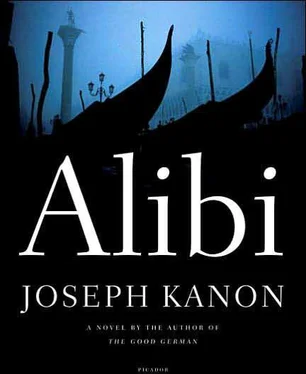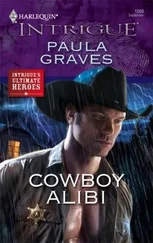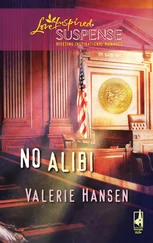Joseph Kanon - Alibi
Здесь есть возможность читать онлайн «Joseph Kanon - Alibi» весь текст электронной книги совершенно бесплатно (целиком полную версию без сокращений). В некоторых случаях можно слушать аудио, скачать через торрент в формате fb2 и присутствует краткое содержание. Жанр: Триллер, на английском языке. Описание произведения, (предисловие) а так же отзывы посетителей доступны на портале библиотеки ЛибКат.
- Название:Alibi
- Автор:
- Жанр:
- Год:неизвестен
- ISBN:нет данных
- Рейтинг книги:3 / 5. Голосов: 1
-
Избранное:Добавить в избранное
- Отзывы:
-
Ваша оценка:
- 60
- 1
- 2
- 3
- 4
- 5
Alibi: краткое содержание, описание и аннотация
Предлагаем к чтению аннотацию, описание, краткое содержание или предисловие (зависит от того, что написал сам автор книги «Alibi»). Если вы не нашли необходимую информацию о книге — напишите в комментариях, мы постараемся отыскать её.
Alibi — читать онлайн бесплатно полную книгу (весь текст) целиком
Ниже представлен текст книги, разбитый по страницам. Система сохранения места последней прочитанной страницы, позволяет с удобством читать онлайн бесплатно книгу «Alibi», без необходимости каждый раз заново искать на чём Вы остановились. Поставьте закладку, и сможете в любой момент перейти на страницу, на которой закончили чтение.
Интервал:
Закладка:
“What’s it?”
“Not enough business of your own.”
I glanced at his thin, almost elfin face, eyes bright and interested behind the half-moon glasses.
“I don’t want to be introduced. To anybody. Fix up someone else.”
“I don’t fix people up,” he said, almost sniffing at the phrase but enjoying himself. “What’s that, army slang?”
“Yes, you do. Those cozy lunch parties and you sitting there watching, like a turtle.”
“A turtle. Listen to him.” He reached to a box on the coffee table for a cigarette, thinking.
“I mean it, Bertie. I can make my own friends.”
“People never do, though, you know. Have you noticed?”
“You seem to do all right.”
He lit the cigarette, looking over the flame with an arched eyebrow. “Well, I hire them. Oh, don’t be vulgar, I don’t mean like that.”
But I grinned anyway, thinking of the long line of research assistants, young men known to be in the house but rarely seen, like upstairs maids.
“One would think you were still twelve years old. Ten.”
“Almost,” I said, still grinning. “Anyway, too young for your black book.”
“Oh, there’s bound to be someone. People have sisters, don’t they?”
And cousins, as it happened. Or, rather, the cousin’s friend, a connection so tenuous that by the time it had been explained we were already introduced.
“He always does that,” I said, as Bertie walked away to join another group. “He says it gives people something to talk about. It’s Claudia, yes?”
She nodded, watching Bertie. It was one of his afternoon drinks parties, too late for tea but early enough to catch the sunset on the Grand Canal outside. Bertie’s palazzo was near the Mocenigo on the Sant Angelo side, just before the canal makes its last bend toward the Accademia bridge, and in winter the late-afternoon light on the water was muted, almost a pale pink. What sun was left seemed to have moved inside to the burning fireplaces making small circles of heat on either side of the room. The crowd was Bertie’s usual mix-pale-faced curators from the Accademia, where he was “attached” without being officially on staff, a few attractive men whom I took to be former research assistants, overdressed expatriates with drinks, and Venetians rich or idle enough not to be at work at five in the afternoon. I had seen her earlier, standing alone by the window, looking out of place and stranded, like someone who’d been promised a drink and been forgotten. She was fingering her collar button, an unconscious distress signal, then caught my eye and stopped, dropping her hand but not looking away. I started over to rescue her, but Bertie suddenly appeared, moving her back into the crowd, still awkward but at least talking to people. By the time he made his way to me, any shyness was gone, her stare frank and curious.
“What do you usually talk about?” she said, her voice almost flat, as if the effort of speaking English had lowered it, brought it down an octave.
“Anything. Where you learned English, for instance.”
“In London. Before the war. My father wanted me to know English. But of course it’s difficult, these past few years. To speak it.”
“It’s fine,” I said, looking at her more carefully now. She was the first person I’d met here who had referred to the war at all. She was thin, with dark curly hair and a long neck held erect, a dancer’s posture. She had come in office clothes, a gray suit with padded shoulders over a white blouse. Given the cocktail dresses around the room, she should have receded, drab against all that plumage, but instead the suit, with its pointed lapels, gave her a kind of intensity. She held herself with an alert directness, full of purpose, so that everything about her, not just the suit, seemed sharply tailored.
“No, it gets rusty. Rusty, yes?” she said, waiting for me to nod. “I need practice. That’s why I asked to meet you.”
“Really? I thought Bertie-”
“Yes, I asked him. You’re surprised?”
“Flattered. I guess. Why me? Practically everyone here speaks English.”
She smiled a little. “Maybe now it’s not so flattering.” She glanced toward the room. “The others look-”
I turned to follow her glance-maids passing trays, everyone talking loudly through wisps of smoke, laughing as the light faded behind them through the window.
“Frivolous,” I said.
She looked surprised, then bit her lip, smiling. “Yes, but I was going to say old. And you were standing by the fire.”
“So I got elected. What if I’m frivolous too?”
“Signor Howard said you were in the war. So it’s different. You were in Germany? In the fighting?”
“At first. Then a kind of cop. Hunting Nazis, for war crimes.”
She stared now, taking this in, interested. “Then you know. How it was. Not like them,” she said, waving her hand a little to take in the room.
“Maybe they’re the lucky ones. Like Venice.”
“Like Venice?”
“You get off the train here, it’s hard to believe anything ever happened.”
“Well, from Germany. But even here, you know, wartime-it’s not so easy.”
“No, I’m sorry,” I said quickly, imagining the lines, the shortages. “I just meant, no bombs. You were here?”
“Most of the time.”
“A true Venetian.”
“Not for Venice. My family was from Rome. It was my grandfather who came here.”
“Your grandfather? In America, that would make you a founding family.”
“Founding?”
“Old.”
“Ah. No, but in Rome we were an old family. Since the empire.”
“Which empire?”
She hesitated, not sure what I meant. “Rome.”
“What, with chariots?”
She smiled. “Yes.”
“Claudia. A Roman name,” I said, watching her sip from her glass, easier now, even the sharp lapels on the suit somehow softer. “How do you know Bertie?”
“I don’t. He invited everyone from the Accademia. I work there. His friend has a cousin who knew-”
“I heard. I couldn’t keep it straight then either. I haven’t been yet-the Accademia. Maybe you’ll give me a tour. Now that we’ve broken the ice.”
“There, that’s one,” she said quickly, ignoring my question. “You can help me with that. What does it mean, break the ice? I know, to be friendly, but how does it mean that? Like breaking through ice on a lake? I don’t understand it.”
“I never thought about it,” I said. “I suppose just a general stiffness, when people don’t know each other, breaking through that.”
“But not melting the ice-you know, the friendship making things warmer. It’s breaking.” She looked down at her drink, genuinely puzzled.
“All right, melted then. But now that is, would you show me around the Accademia?”
“You should have a guide for that. I’m not really an expert on the paintings.”
“I’m not interested in the paintings.”
“Oh,” she said, unexpectedly flustered. She looked away. “Are you in Venice long?” A party question.
“My mother’s living here-for now, anyway. She’s one of the frivolous people over there.”
“I didn’t mean-”
“No, she is frivolous. It’s part of her charm. It’s what everybody likes about her.”
“Including you?”
“Sure.”
“A son who loves his mother. Very Italian.”
“You see how respectable. So, how about it? Some lunch hour? I’ll help you with your English.”
She looked directly at me. “Why?”
I stood there for a second, not knowing how to answer. “Why?” I said finally. “I don’t know. I’m in Venice. I should get to know some Venetians.”
“They’re Venetian,” she said, moving her hand toward the others.
Читать дальшеИнтервал:
Закладка:
Похожие книги на «Alibi»
Представляем Вашему вниманию похожие книги на «Alibi» списком для выбора. Мы отобрали схожую по названию и смыслу литературу в надежде предоставить читателям больше вариантов отыскать новые, интересные, ещё непрочитанные произведения.
Обсуждение, отзывы о книге «Alibi» и просто собственные мнения читателей. Оставьте ваши комментарии, напишите, что Вы думаете о произведении, его смысле или главных героях. Укажите что конкретно понравилось, а что нет, и почему Вы так считаете.












